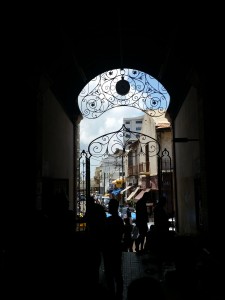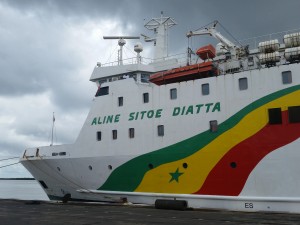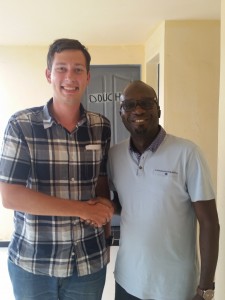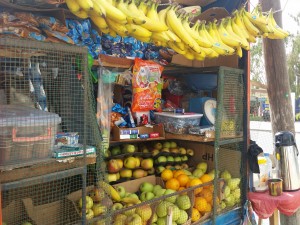LUMOS Final Report: Sean Grossnickle
Senegal 2017
Every time I try to put words to my Lumos experience, I feel as if I do injustice to what I felt and saw. I can put it into numbers: 19 loans given totaling over 2,000,000 FCFA (≈ $3,600), over 50 hours of business courses taught to over 30 people, visits made, reimbursements collected and questionnaires given to over 60 beneficiaries. But numbers cannot describe the people I met or the experiences that changed the way I see the world. I generally avoid making expectations to allow myself to be more open to what God has set before me, so prior to leaving I tried not to think about what it would be like when I arrived. The best way to describe how I found life in Senegal is simple: it’s different.
The people in Senegal live simple lives, and although that term is often used as derogatory in first-world countries, I use it here to mean their cares and worries are few. Their lives are built around their religion and family, everything else comes second. Their day-to-day lives ebb and flow with the religious teachings and festivals. Living in Senegal during Ramadan was quite the experience, nothing was the same. There, one gives everything to help his family, even at the expense of his personal health, well-being and desires. That was quite the change coming from a society that places the individual’s needs above all else and where being late to work to spend some time with an old friend is unacceptable. Before I could truly begin my work there, I had to accept the change of priorities and realize that my values are just as foreign to them as theirs are to me. Asking someone to ignore their phone call from their brother, even to sign a contract to get their loan, would be met with much contempt. I would have also lost all respect with the person I was talking to if I did not take the time to properly greet him. I did not lose or forsake my values while living among the Senegalese, but rather I learned to show respect and love by yielding to how they would prefer things get done. Doing this is necessary for anyone who would like to live or work abroad, and I am glad I got to learn it in a low-stress environment such as Senegal.
I believe the work I did yielded much fruit and that my presence in the country was meaningful. This was true at the most basic level because Projects Abroad Senegal’s microfinance office runs off the charity model: no interest is charged on loans and the project would come to a sudden halt if no volunteers came to work. The basic idea behind microfinance is to empower people through giving them access to credit, following the age-old mantra that you need to spend money to make money. Since credit is so scarce among the Senegalese, people from impoverished backgrounds with great ideas have no way better themselves and their situation. Credit is always readily available in America, especially for small-scale ventures, with interest rates for people with bad credit still being better than what someone with the best credit in Senegal can find. I think this is why it was hard to wrap my mind around the fact that even giving a loan of $90 could radically change someone’s life. And I got to see it happen.
As I stepped into people’s homes to do a questionnaire or review a business plan, I took a step into their lives and realities. Most of the women who participated in our program were widows who needed to be able to support their children. Most of the men simply had nothing at all, not even a slab of cement on which to sleep. With too much dignity to beg and no place willing to give them the tools to work, each was left to sell the clothes off his back to survive. These were the people who we admitted into our program. I was able to teach the business classes in French to give the beneficiaries a basic knowledge of how to run a business. Cost accounting was often the trickiest part for us and for the beneficiaries; some of the women were selling products at a loss before they knew how to track their expenses. I also got to create the business plans to ensure that they would be able to have a sustainable business and make enough profit to better their situation. It was in this that I felt the most useful to the project. Doing the market research was essential to making sure the money we gave could have its maximum potential. I have heard of other programs that simply give the money with no training or business plan, setting the person up for failure and leaving them with no hope of getting the money back. Our program was charity in the sense that the training was free and the loans had no interest, but it empowered the people to finish their loan repayments and continue to sustain themselves without us.
I know that the loans we gave made a substantial difference in the lives of the beneficiaries. Selly Ba sells fabric, purses and shoes and she uses the profit to help her sons have a better life. She put her eldest son through technical training to become an auto technician and her younger son was able to attend a soccer academy. You could tell the loan gave her confidence in herself and she is proud of how she supports her family. Another beneficiary, Ibrahima Ba (no relation to Selly), used his loan to start what is now one of the most successful kiosks in Saint Louis. With his profit, he is able to afford a house for his family who had been living apart and put his kids through school. He holds his head high and is not afraid to tell you that he dreams of owning his own shop in the market one day. On a more modest level, we had a lot of widows and divorcees that were able to use the profit they made to pay the rent for their apartment and feed their kids properly. Microfinance to me is about giving people an opportunity to use their talent and resources to better their lives for themselves, not depending on charity. One closing note, I would like to see a microfinance program that allows people to develop a skill, such as carpentry or welding, instead of only financing entrepreneurs with small-businesses. Some people are blessed with talent and I would love to see them develop these skills, get a good job and then be able to pay back the loan. This is hard logistically as it requires a long grace period and there is no guarantee he will get the job, but I would like to explore the idea further one day.
Arguably the most valuable part of any adventure is the relationships formed along the way. Relationships are so much more rooted in Senegalese culture than in American culture. The idea that a relationship could be “strictly business” does not exist because every relationship formed is personal, each person has a special way of impacting another. A relationship takes priority over a meeting, class or business deal. This manifests itself in the greetings; a formal greeting checks every aspect of a person’s well-being and shows genuine care for the other. I have met many Senegalese who have touched my heart and have invested in my life. It was a struggle for me to show the same concern, especially if I was on my way to a meeting or a meal. Simply acknowledging the person who you passed on the street was seen as a way of showing respect for the other. I learned to value these small interactions and that giving five extra seconds of my time could go miles in both my life and theirs. It was enjoyable to walk around and get to know the shop owners downtown, the baker on my street and the friends of my host family. The other volunteers played an important role as well as we processed the new way of life together. This is one of the most valuable takeaways for me, to realize that all of life is relationship with others. I cannot live in isolation, so why do I distance myself from the very ones who make my life what it is?
I have just a final few thoughts that can also be taken as advice for future LUMOS travelers. Learning the language of the host country in one of the most important and rewarding activities in which a person can engage. It also goes miles to show your personal care and interest in the country and its people. Even though I did not speak the mother tongue of Senegal, Wolof, people were intrigued that an American could speak French well, something that was quite a bit less common than I thought. My last note is that I feel it is important to travel the country, not to see the sites but rather to gain a broader understanding of the various subcultures that compose the heart and soul of the country. In Senegal, there are three primary regions: the north and central region (where Saint Louis was located), Dakar (the capital and its surrounding area) and the Casamance (the region located south of Gambia). I had the opportunity to visit the two latter regions during my last two weeks, and I cannot express how much that allowed me to gain a fuller prospective on the country and its people. I was able to see what aspects of Senegalese culture bound them together and what ones historically have driven them apart. I walked away from Senegal feeling like it was in some ways my own and someplace I knew deeply.
The three months I got to spend in Senegal were in many ways not easy. There were ups and downs, mistakes and successes, tears and laughter. But I do know that my experience was something that allowed me to grow beyond belief and gain such a deeper understanding of the world, and I will always be thankful for the time I spent in Africa.












































